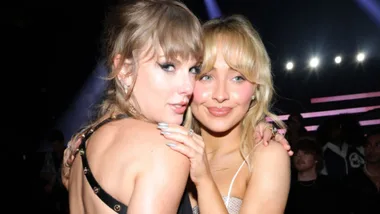A viral trend, a workplace quirk, a TikTok-ready personality trait – whatever you want to call it, the ‘Gen Z stare’ has (apparently) become a defining expression of a generation.
Posts about the deadpan glare often associated with the viral moniker have spread through social media like wildfire. And, like Millennial moths to a zoomer flame, debate around its deeper meaning and possible reasons behind it, are fueling intergenerational discourse once more.
But far from another Gen Z gesture for Millennials to get worked up about (we’re still processing their claim to the side part tbh) the seemingly judgemental reaction – or rather, non-reaction – has transcended the usual methods of interpretation – one that seeks to pigeonhole the younger generation as “lazy” or “chronically online” – and evolved to something more.
So what exactly is the Gen Z stare and why is it impossible to escape right now?
What Is The Gen Z Stare?
According to social media, the “Gen Z stare” is a vacant, expressionless stare that some zoomers are using to respond to questions or conversation prompts in lieu of what most generations would call etiquette.
If you asked zoomers (though there’s plenty of conflicting arguments) they’d likely tell you it’s the look they give someone when they’ve just been asked a stupid question that doesn’t deserve a verbal response.
For the most part, examples have been associated with the blank look of a customer service or hospitality employee when they’re asked what most would consider an innocuous or even well-meaning question. However, there’s a cohort that considers it to be a broader phenomenon, too.
One video by TikTok user Riley Despot, 30, describes an interaction with a gen z golf instructor that left her confused. In the video (currently sitting at one million views) she recalls thanking the instructor for agreeing to teach her child, only to receive a blank stare and a “yeah” in response. When she pushed through the awkwardness to ask how she should pay the instructor, she was met with an equally indifferent answer, that wasn’t really an answer at all.
What Does It Mean?
While there’s still conflicting arguments about the exact meaning behind the Gen Z stare, most argue that it’s an inability to make small talk brought on by a generation raised on screens. Others have likened it to an anxiety-led response, or even the result of being forced to spend their formative years locked inside because of Covid.
Dr Jean Twenge, author of Generations: The Real Differences Between Gen Z, Millennials, Gen X, Boomers and Silents told the New York Times, that while it’s possible a pandemic has played some part in the disconnect between social etiquette-related expectations and gen z’s ability to perform them, it’s more likely about a decline in face-to-face interactions.
“Social skills take thousands and thousands of hours to develop and adolescence is a critical period for developing social skills,” Dr. Twenge said. “And Gen Z has spent much less time with their peers in person during that critical stage.”
The origins of the term aren’t exactly clear, and the definition is vague, but for the most part, it seems to have originated online sometime in late 2024, before reaching its subsequent virality in the last few weeks after thousands of clips started appearing in response to the #genzstare.

Online, the Gen Z stare is being read as everything from disaffected apathy to a refusal to “play nice”. Some say it reflects emotional detachment, while others see it as a coping mechanism to demanding workloads and professional expectations (especially in service-related jobs).
“Fair. A lot of Gen Z don’t know how to talk to people,” Efe Ahworegba, 19, said in her now-viral TikTok where she discussed the Gen Z stare. “But a lot of older generations talk too much, too rudely, and too proudly while being too stupid.”
“The Gen Z stare is basically us saying the customer is not always right,” Ahworegba added, prompting many to flood the comments section with observations of their own, including objections to Gen Z laying claim to the “stare” in the first place.
“I think it’s hilarious that Gen Z thinks they’re the first generation to ever deal with stupidity or difficult customers,” wrote one user, adding: “And that’s how they justify the fact that they just disassociate and mindlessly stare into space whenever they are confronted with a difficult or confusing situation, instead of immediately engaging in the situation like every other generation has ever done before them lol.”
Is It Just Another Form Of The “Millennial Pause”?

TikToker @maybesantana argued that while the “customer service stare” might be valid in some situations, it’s different from the “Gen Z stare.”
Any customer facing worker might respond with a blank stare when you ask something “stupid,” they explained. But the “Gen Z stare,” is the “lead paint stare that customer service workers receive instead of response to anything,” they said.
The user referred to the “lead paint stare” associated with the baby boomer generation, which was a literal result of lead-poisoning from using lead-based paints in the 70s. But it’s not the only parallel.
Of course, Gen Z have long roasted the older generation for what they called a “Millennial Pause”. Classified by a brief pause that occurs at the beginning of a video recording, the stereotype is just another example of intergenerational judgement that seems to have reared its divisive head yet again.
“Generations have been doing these comparisons for time immemorial, but nowadays there is this medium that allows for those conversations to be ramped up,” Edith Cowan University psychology lecturer Shane Rogers explained in an interview with ABC.
“If there were more boomers and gen X that use TikTok, you would probably see more conversations about that as well.”
“But the main users are millennials and gen Z right now, so that is where a lot of the conversation is at,” he added.
Who Is The Gen Z Age Group?
Gen Z is a generation defined by people born between 1997 and 2012. That makes the oldest members in their late twenties and the youngest still in school.
It’s a cohort that grew up with smartphones and entered adolescence during a global pandemic – and one that’s increasingly being linked to phenomenons like abstaining from sex for longer, clean living, and even (heaven forbid) setting boundaries in the workplace.
They’ve also come of age at a time when social and economic precarity is the norm as opposed to the exception – which has arguably influenced their ability to move through the world. And who could blame them?
Related articles:
- Is Gen Z In A Sex Recession?
- Three Generations Debate What Appropriate Work Boundaries Actually Look Like


